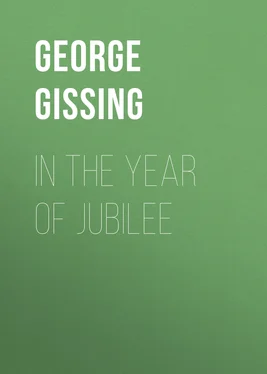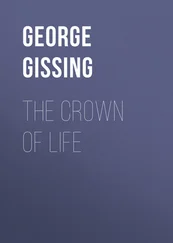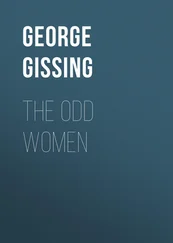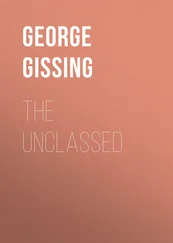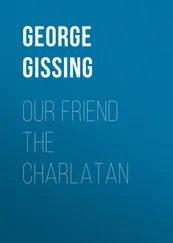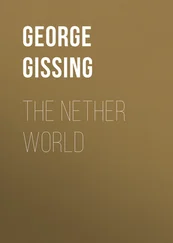George Gissing - In the Year of Jubilee
Здесь есть возможность читать онлайн «George Gissing - In the Year of Jubilee» — ознакомительный отрывок электронной книги совершенно бесплатно, а после прочтения отрывка купить полную версию. В некоторых случаях можно слушать аудио, скачать через торрент в формате fb2 и присутствует краткое содержание. Жанр: foreign_prose, literature_19, foreign_antique, на английском языке. Описание произведения, (предисловие) а так же отзывы посетителей доступны на портале библиотеки ЛибКат.
- Название:In the Year of Jubilee
- Автор:
- Жанр:
- Год:неизвестен
- ISBN:нет данных
- Рейтинг книги:4 / 5. Голосов: 1
-
Избранное:Добавить в избранное
- Отзывы:
-
Ваша оценка:
- 80
- 1
- 2
- 3
- 4
- 5
In the Year of Jubilee: краткое содержание, описание и аннотация
Предлагаем к чтению аннотацию, описание, краткое содержание или предисловие (зависит от того, что написал сам автор книги «In the Year of Jubilee»). Если вы не нашли необходимую информацию о книге — напишите в комментариях, мы постараемся отыскать её.
In the Year of Jubilee — читать онлайн ознакомительный отрывок
Ниже представлен текст книги, разбитый по страницам. Система сохранения места последней прочитанной страницы, позволяет с удобством читать онлайн бесплатно книгу «In the Year of Jubilee», без необходимости каждый раз заново искать на чём Вы остановились. Поставьте закладку, и сможете в любой момент перейти на страницу, на которой закончили чтение.
Интервал:
Закладка:
Yes, Stephen remembered. He had frequently called it to mind, and wondered whether it was wisely said, the youth’s character considered.
‘What of that?’ he returned, still genially. ‘Do you think of starting a new line of ocean steamships?’
‘Well, not just yet,’ Horace answered, with an uncertain laugh. ‘I have something more moderate in view. I may start a competition with the P. and O. presently.’
‘Let’s hear about it.’
‘I dare say it will surprise you a little. The fact is, I—I am thinking of getting married.’
The father did not move, but smoke ceased to issue from his lips, and his eyes, fixed upon Horace, widened a little in puzzled amusement.
‘Thinking of it, are you?’ he said, in an undertone, as one speaks of some trifle. ‘No harm in thinking. Too many people do it without thinking at all.’
‘I’m not one of that kind,’ said Horace, with an air of maturity which was meant to rebuke his father’s jest. ‘I know what I’m about. I’ve thought it over thoroughly. You don’t think it too soon, I hope?’
Horace’s pipe was going out; he held it against his knee and regarded it with unconscious eyes.
‘I dare say it won’t be,’ said Mr. Lord, ‘when you have found a suitable wife.’
‘Oh, but you misunderstand me. I mean that I have decided to marry a particular person.’
‘And who may that be?’
‘The younger Miss. French—Fanny.’
His voice quivered over the name; at the end he gave a gasp and a gulp. Of a sudden his lips and tongue were very dry, and he felt a disagreeable chill running down his back. For the listener’s face had altered noticeably; it was dark, stern, and something worse. But Mr. Lord could still speak with self-control.
‘You have asked her to marry you?’
‘Yes, I have; and she has consented.’
Horace felt his courage returning, like the so-called ‘second wind’ of a runner. It seemed to him that he had gone through the worst. The disclosure was made, and had resulted in no outbreak of fury; now he could begin to plead his cause. Imagination, excited by nervous stress, brought before him a clear picture of the beloved Fanny, with fluffy hair upon her forehead and a laugh on her never-closed lips. He spoke without effort.
‘I thought that there would be no harm in asking you to help us. We should be quite content to start on a couple of hundred a year—quite. That is only about fifty pounds more than we have.’
Calf-love inspires many an audacity. To Horace there seemed nothing outrageous in this suggestion. He had talked it over with Fanny French several times, and they had agreed that his father could not in decency offer them less than a hundred a year. He began to shake out the ashes from his pipe, with a vague intention of relighting it.
‘You really imagine,’ said his father, ‘that I should give you money to enable you to marry that idiot?’
Evidently he put a severe restraint upon himself. The veins of his temples were congested; his nostrils grew wide; and he spoke rather hoarsely. Horace straightened his back, and, though in great fear, strung himself for conflict.
‘I don’t see—what right—to insult the young lady.’
His father took him up sternly.
‘Young lady? What do you mean by “young lady”? After all your education, haven’t you learnt to distinguish a lady from a dressed-up kitchen wench? I had none of your advantages. There was—there would have been some excuse for me , if I had made such a fool of myself. What were you doing all those years at school, if it wasn’t learning the difference between real and sham, getting to understand things better than poor folks’ children? You disappointed me, and a good deal more than I ever told you. I had hoped you would come from school better able to make a place in the world than your father was. I made up my mind long ago that you should never go into my business; you were to be something a good deal better. But after all you couldn’t, or wouldn’t, do what I wanted. Never mind—I said to myself—never mind; at all events, he has learnt to think in a better way than if I had sent him to common schools, and after all that’s the main thing. But here you come to me and talk of marrying a low-bred, low-minded creature, who wouldn’t be good enough for the meanest clerk!’
‘How do you know that, father? What—what right have you to say such things, without knowing more of her than you do?’
There was a brief silence before Mr. Lord spoke again.
‘You are very young,’ he said, with less vehement contempt. ‘I must remember that. At your age, a lad has a sort of devil in him, that’s always driving him out of the path of common sense, whether he will or no. I’ll try my best to talk quietly with you. Does your sister know what has been going on?’
‘I daresay she does. I haven’t told her in so many words.’
‘I never thought of it,’ pursued Mr. Lord gloomily. ‘I took it for granted that everybody must see those people as I myself did. I have wondered now and then why Nancy kept up any kind of acquaintance with them, but she spoke of them in the rational way, and that seemed enough. I may have thought that they might get some sort of good out of her , and I felt sure she had too much sense to get harm from them . If it hadn’t been so, I should have forbidden her to know them at all. What have you to say for yourself? I don’t want to think worse of you than I need. I can make allowance for your age, as I said. What do you see in that girl? Just talk to me freely and plainly.’
‘After all you have said,’ replied Horace, his voice still shaky, ‘what’s the use? You seem to be convinced that there isn’t a single good quality in her.’
‘So I am. What I want to know is, what good you have found.’
‘A great deal, else I shouldn’t have asked her to marry me.’
A vein of stubbornness, unmistakable inheritance from Stephen Lord, had begun to appear in the youth’s speech and bearing. He kept his head bent, and moved it a little from side to side.
‘Do you think her an exception in the family, then?’
‘She’s a great deal better in every way than her sisters. But I don’t think as badly of them as you do.’
Mr. Lord stepped to the door, and out into the passage, where he shouted in his deep voice ‘Nancy!’ The girl quickly appeared.
‘Shut the door, please,’ said her father. All three were now standing about the room. ‘Your brother has brought me a piece of news. It ought to interest you, I should think. He wants to marry, and out of all the world, he has chosen Miss. French—the youngest.’ Horace’s position was trying. He did not know what to do with his hands, and he kept balancing now on one foot, now on the other. Nancy had her eyes averted from him, but she met her father’s look gravely.
‘Now, I want to ask you,’ Mr. Lord proceeded, ‘whether you consider Miss. French a suitable wife for your brother? Just give me a plain yes or no.’
‘I certainly don’t,’ replied the girl, barely subduing the tremor of her voice.
‘Both my children are not fools, thank Heaven! Now tell me, if you can, what fault you have to find with the “young lady,” as your brother calls her?’
‘For one thing, I don’t think her Horace’s equal. She can’t really be called a lady.’
‘You are listening?’
Horace bit his lip in mortification, and again his head swung doggedly from side to side.
‘We might pass over that,’ added Mr. Lord. ‘What about her character? Is there any good point in her?’
‘I don’t think she means any harm. But she’s silly, and I’ve often thought her selfish.’
Читать дальшеИнтервал:
Закладка:
Похожие книги на «In the Year of Jubilee»
Представляем Вашему вниманию похожие книги на «In the Year of Jubilee» списком для выбора. Мы отобрали схожую по названию и смыслу литературу в надежде предоставить читателям больше вариантов отыскать новые, интересные, ещё непрочитанные произведения.
Обсуждение, отзывы о книге «In the Year of Jubilee» и просто собственные мнения читателей. Оставьте ваши комментарии, напишите, что Вы думаете о произведении, его смысле или главных героях. Укажите что конкретно понравилось, а что нет, и почему Вы так считаете.
